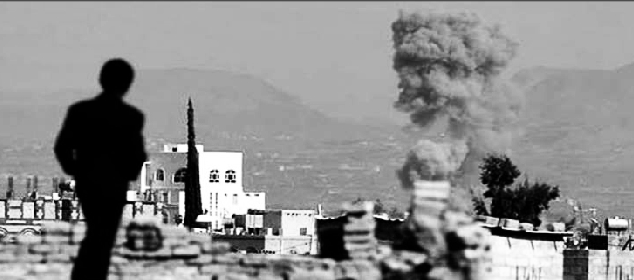The United States has officially cast itself a lead role in the bloody Saudi Arabian war in Yemen. On Oct. 12, the U.S. Pentagon Press Secretary Peter Cook, confirmed three distinct bombings that targeted radar sites belonging to the Iranian-backed Houthi rebels on Yemen’s Red Sea Coast. According to the Pentagon’s press release, this was a reactionary measure to missile strikes from the Houthis that threatened the USS Mason.
“These limited self-defense strikes were conducted to protect our personnel, our ships, and our freedom of navigation in this important maritime passageway,” stated the press release. “The United States will respond to any further threat to our ships and commercial traffic, as appropriate, and will continue to maintain our freedom of navigation in the Red Sea, the Bab al-Mandeb, and elsewhere around the world.”
Until now, the Obama Administration has remained at arm’s length from the conflict by supplying weapons and offering aerial refuels to the Saudi war effort. Since March 2015, the U.S. has been indirectly involved with Saudi Arabia in Yemen’s civil war against the Houthi rebels.
According to an article published in the New York Times on Oct. 8 , the U.S. may face war crimes for supplying Saudi with arms and the United Nations revealed that the funeral airstrikes have killed more than 140 victims. According to a Yemeni Health Ministry representative, more than 600 people were injured and hospitals admitted more than 114 people during the airstrikes following the Oct. 8 funeral attacks.
The Obama Administration has distanced themselves from Saudi armed forces after they bombed the funeral.
“U.S. security cooperation with Saudi Arabia is not a blank check,” stated a Oct. 8 press release by National Safety Council spokesman Ned Price. “Even as we assist Saudi Arabia regarding the defense of their territorial integrity, we have and will continue to express our serious concerns about the conflict in Yemen and how it has been waged.”
During the turbulent president election that has energized America’s political awareness, neither candidate has made any direct comments on Yemen or openly discussed the relationship with Saudi Arabia. This has prompted an open discussion among Suffolk University students, many of whom are studying in America from countries that this conflict touches.
A student from Saudi Arabia who wished to remain anonymous because of her opposing views against her country’s actions said she believes that the U.S. should stop aiding Saudi Arabia.
“The U.S. should stop because as a moral standing, by supporting Saudi Arabia’s military action the U.S. is a part of serious war crimes and are indirectly at fault for the devastating humanitarian crisis the people of Yemen now face,” said the student. “They should stop aiding Saudis so the war might stop.”
The civil war that has enveloped Yemen has had incredibly detrimental side effects. Countless civilians have been used as cannon fodder for Saudi airstrikes, which has been a concern for those who have remained up to date on the conflict.
“Whenever civil war happens, or when the people are trying to get rid of the rebels, you don’t end up getting rid of the rebels, you end up getting rid of the civilians,” said Meryan Bakati, sophomore accounting major and member of the Muslim Conversations group. “The people and the children that did nothing, that’s what ends up happening.”
Students have also held the view that the U.S., which has acted as a mediator for global conflict, must interfere for the sake of the Yemeni people.
“For Humanitarian sake I feel like U.S. involvement is necessary,” Darlley Joselus, sophomore applied legal studies major and member of the Black Students Union. “It should only focus on finding peaceful resolutions or setting up treaties that would allow aid to be given to the citizens.”
Yemen’s domino effects of Saudi strikes have hit several heavily civilian populated areas, according to a recent article in the New York Times. The U.N. criticized the U.S.- Saudi alliance for 60 percent of the deaths and injuries to Yemeni children last year. Under international law, strikes on civilians and civilian populated areas are not military targets.
Donald Trump and Hillary Clinton are set off for a final debate. With the recent developments in Yemen, it is likely that the candidates will tackle the issue.







